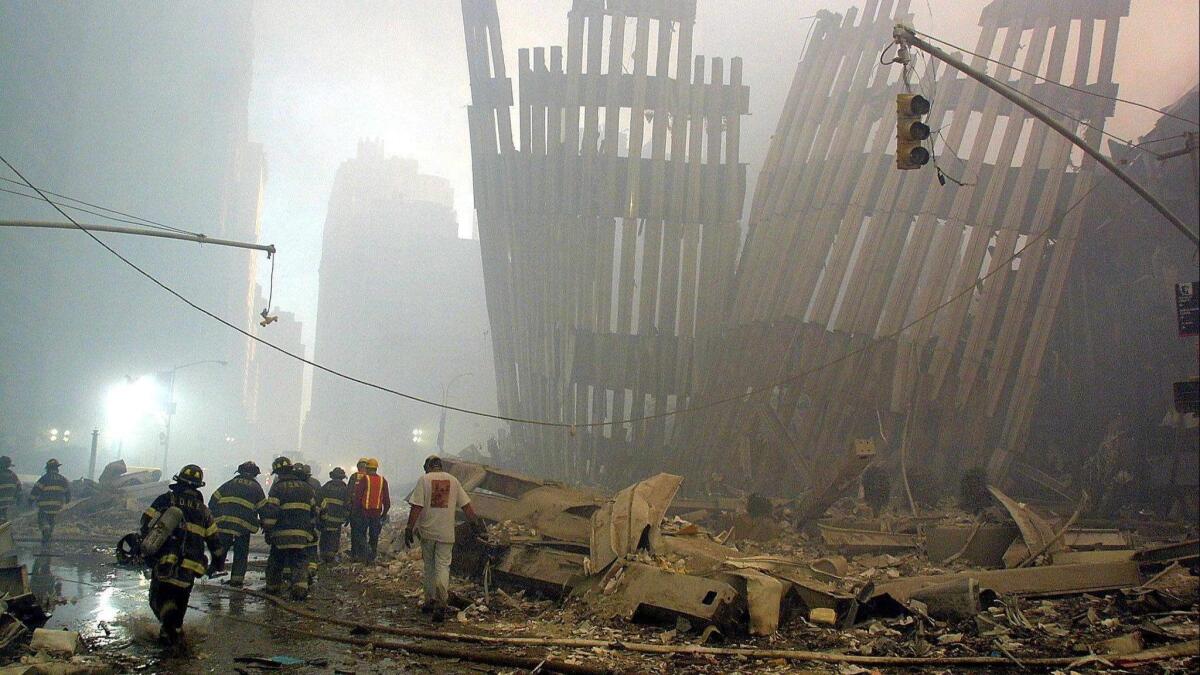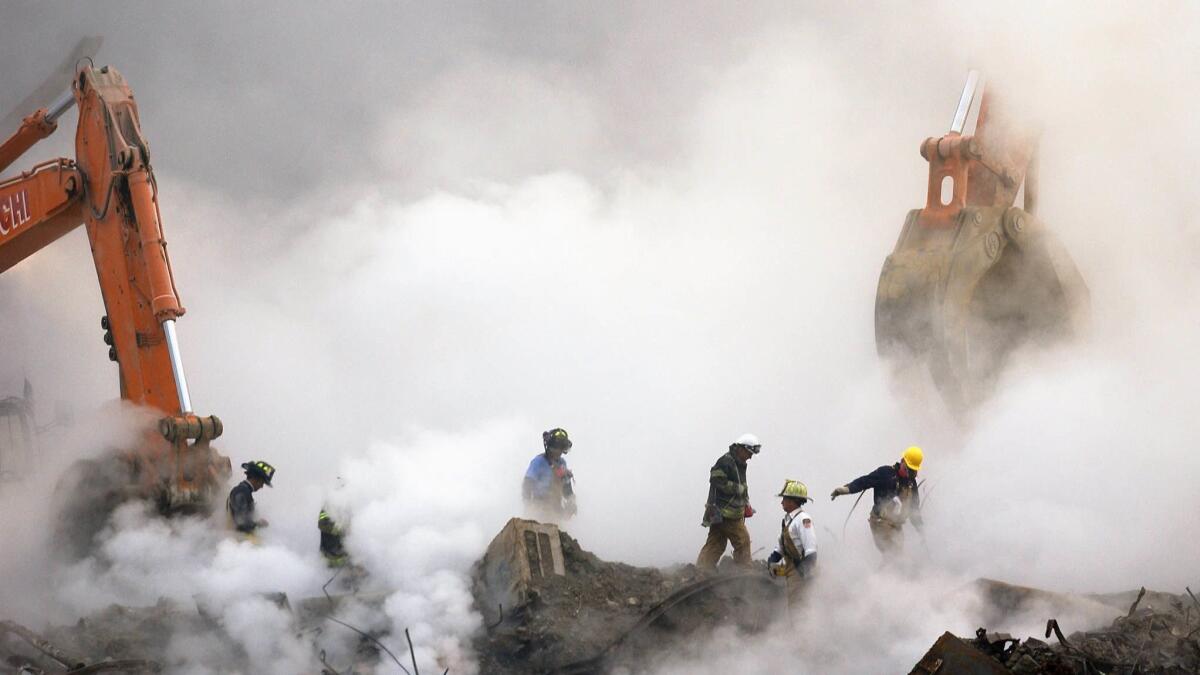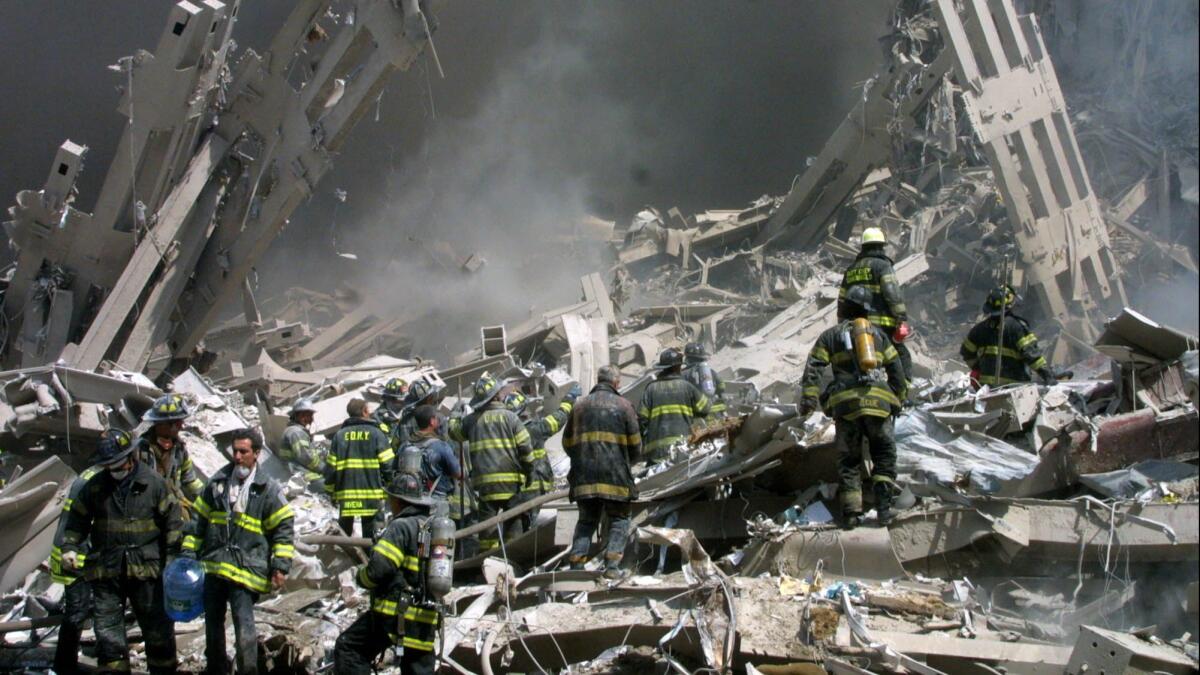For firefighters who worked in World Trade Center rubble, the future includes a heightened risk of cancer

- Share via
It’s been nearly 16 years since cleanup work officially ended at New York City’s ground zero, but the health effects for rescue and recovery workers are still making themselves known.
Two studies published Thursday in the journal JAMA Oncology suggest that the firefighters who came to lower Manhattan after the Sept. 11, 2001, attacks on the World Trade Center face a heightened risk of cancer — and will continue to do so for years to come.
From the time that airliners flew into the twin towers through the months it took to remove the wreckage, ground zero was replete with substances that are either known or suspected carcinogens. Dust from the collapsed buildings, smoke from smoldering fires and exhaust from heavy equipment put workers in contact with asbestos, glass fibers, lead, dioxins, PCB (polychlorinated biphenyl), PAHs (polycyclic aromatic hydrocarbons) and other hazards.
Researchers have been tracking people who spent time at the site, including thousands of the New York City firefighters and EMS workers who are part of the World Trade Center Health Program. In the first decade after the attacks, 697 cancers were diagnosed among 15,507 participants.
In all likelihood, some of those cancers would have been diagnosed if the Sept. 11 attacks had never happened. But not all of them.
To see how many could be traced to ground zero exposure, a team from the FDNY’s Bureau of Health Services and Office of Medical Affairs compared data on firefighters who worked at the site with data from a cancer registry of New York residents. To simplify the analysis, the researchers focused on white men.
Based on their actual cancer incidence through the end of 2011, the 12,374 firefighters were on track to be diagnosed with 2,714 cancers between the start of 2012 and the end of 2031, the researchers found. However, if those same firefighters got cancer at the same rate as other white men in New York City, they would expect to be diagnosed with only 2,596 cancers during that 20-year period.

That difference — 118 additional cancers — was too large to be due to chance, said Rachel Zeig-Owens, director of epidemiology for the FDNY’s WTC Health Program, who led the study with Dr. David Prezant, the Fire Department’s chief medical officer.
Three types of cancer appeared to fuel this increase, the research team found. They calculated that this cohort of firefighters would be diagnosed with 574 extra cases of prostate cancer, 16 excess cases of thyroid cancer and 70 additional cases of melanoma over the 20-year period. However, cases of several other kinds of cancer were projected to be lower for the firefighters than for the general public.
Cancers of the prostate and thyroid are more likely to be diagnosed in patients who get more frequent screenings, and the people who worked at the WTC site may be more likely to be screened because researchers are tracking them.
When the study authors accounted for that potential source of bias, they found that the total number of cancers expected to be diagnosed in white male firefighters who worked at the WTC site was not significantly higher than for other white male New Yorkers. However, the firefighters still faced a greater risk of prostate cancer, with 408 additional cases expected to be diagnosed over 20 years.
The study authors warned against extrapolating their findings to other people who were exposed to toxins and carcinogens at ground zero. The firefighters may have a different baseline cancer risk due to the nature of their jobs, they wrote. On the flip side, since their work is physically demanding, they may have been in better health than other New Yorkers at the time of the attack.
Either way, the researchers said firefighters and others who put their health on the line should be required to use “appropriate protective equipment.” They also called for limits on “the amount of time workers can spend at disaster sites.”

A second study focused on a single type of cancer: multiple myeloma. As of July 1, 2017, 16 white male firefighters who worked at ground zero were diagnosed with this cancer, which affects plasma cells in the bone marrow.
Although 16 cases may not sound like very many, the study authors were struck by certain features of these patients.
The youngest of them was only 38 years old when diagnosed with the disease, and the oldest was 76. The median age for the group was 57 — 12 years younger than for the United States as a whole.
Seven firefighters had their bone marrow tested for a tumor marker called CD20 that is “associated with a poorer prognosis,” the study authors wrote. Five of them — or 71% — tested positive. In a more typical population, only about 20% of multiple myeloma patients would have this marker.
The researchers also screened 781 white male firefighters who worked at the WTC site to see if they had early signs of multiple myeloma. Sure enough, these men were about 80% more likely to have the precursor disease than those in a comparison population of white men from Minnesota who were previously screened for the condition.
What’s more, the firefighters were disproportionately likely to have a type of this disease that was also more common among veterans who were exposed to the cancer-causing chemical defoliant known as Agent Orange, the study authors noted.
Working at ground zero was almost certainly hazardous to one’s health. But proving that it caused cancer, especially in a particular person, is easier said that done, according to Dr. Otis W. Brawley, the chief medical and scientific officer for the American Cancer Society.
“When these WTC heroes are diagnosed as having a cancer, even a cancer common in the population, there is a natural tendency to assume it is due to their service at the WTC,” Brawley wrote in an editorial that accompanies both studies.
But that might not be the case, he wrote.
A combination of factors — including the relatively small number of people who worked at the site, the relatively short period of time since the exposure occurred, and the relatively low incidence of some of these cancers in the general population — make it hard to find a definitive signal.
“The WTC attack is an emotional subject. Cancer is also an emotional subject,” Brawley wrote. “Perhaps this issue is beyond the limits of science.”
Follow me on Twitter @LATkarenkaplan and “like” Los Angeles Times Science & Health on Facebook.
MORE IN SCIENCE
Scientists have a promising new approach for treating drug-resistant tuberculosis
A pileup of 14 distant galaxies is set to become the most massive structure in the universe
In human cells, scientists find DNA that looks like a twisted knot instead of a double helix







